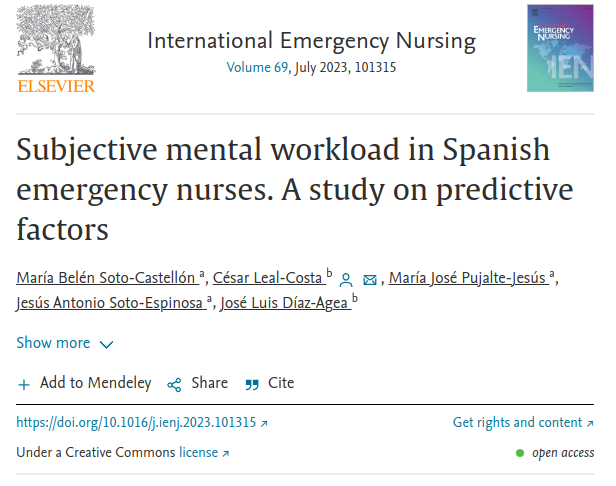 Mental workload refers to the cognitive or intellectual requirements that a worker is subjected to in a workday. The objective of the present work was to discover the subjective mental workload of nursing staff at Hospital Emergency Units, and its relationship with sociodemographic, work, environmental factors at the workplace, and personality variables. Method: A quantitative, descriptive, observational, and crosssectional study was conducted with 201 emergency nurses from 13 different provinces in Spain. Each participant completed 5 questionnaires (sociodemographic, work conditions, environmental conditions, personality, and subjective mental workload). Descriptive statistics were obtained, and Pearson’s correlations and multivariate models (multiple linear regression) were performed. Results: The nurses had medium to high levels of mental workload. The environmental conditions had a direct relationship with the mental workload, especially with respect to noise and lighting. The participants obtained high scores in kindness, responsibility, openness/intellect, and extraversion. Positive and statistically significant relations were found between neuroticism and mental workload. Being female, older, and having stable employment or a permanent contract were associated with a greater mental workload of emergency nurses. Conclusion: The domain of neuroticism personality, and the hygienic conditions in the workplace were the predictors with the most weight in the model. This study could be useful for defining aspects that need to be considered for the well-being of emergency nurses, such as lighting conditions or environmental noise in the workplace. It also invites reflection on the influence of personal factors (age, gender, personality) and work factors (type of contract, professional experience) on the mental workload of emergency nurses.
Mental workload refers to the cognitive or intellectual requirements that a worker is subjected to in a workday. The objective of the present work was to discover the subjective mental workload of nursing staff at Hospital Emergency Units, and its relationship with sociodemographic, work, environmental factors at the workplace, and personality variables. Method: A quantitative, descriptive, observational, and crosssectional study was conducted with 201 emergency nurses from 13 different provinces in Spain. Each participant completed 5 questionnaires (sociodemographic, work conditions, environmental conditions, personality, and subjective mental workload). Descriptive statistics were obtained, and Pearson’s correlations and multivariate models (multiple linear regression) were performed. Results: The nurses had medium to high levels of mental workload. The environmental conditions had a direct relationship with the mental workload, especially with respect to noise and lighting. The participants obtained high scores in kindness, responsibility, openness/intellect, and extraversion. Positive and statistically significant relations were found between neuroticism and mental workload. Being female, older, and having stable employment or a permanent contract were associated with a greater mental workload of emergency nurses. Conclusion: The domain of neuroticism personality, and the hygienic conditions in the workplace were the predictors with the most weight in the model. This study could be useful for defining aspects that need to be considered for the well-being of emergency nurses, such as lighting conditions or environmental noise in the workplace. It also invites reflection on the influence of personal factors (age, gender, personality) and work factors (type of contract, professional experience) on the mental workload of emergency nurses.